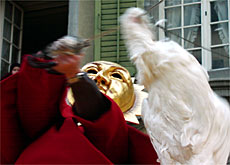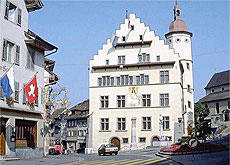Sursee mixes baroque and modern architecture

The town of Sursee, near Lucerne, has been commended for its combination of tradition and innovative town planning.
Its exemplary balancing act has earned Sursee the Wakker prize for the protection of Switzerland’s heritage.
The prize is awarded annually by the Swiss national heritage foundation.
“We are proud but we won’t let it go to our heads,” town archivist Stefan Röllin told swissinfo.
But Sursee, a town of 8,000 residents founded in the 13th century, has every reason to boast.
The historic centre is separated from the modern district by an imposing building, designed and erected by the celebrated Ticino architect, Luigi Snozzi, a name that lends the town a special prestige.
The building itself – known as the Stadthof – is restrained and clean-lined. Initially intended to house public administration offices, it rises over the main square, like a massive hinge, linking the old to the new.
Transformation
The first thing that strikes the visitor about Snozzi’s edifice is its bulk – 53 metres by 53. Its sheer monumentality instantly transforms a district into a town.
Today, the Stadthof contains shops, banks, a post office and other offices. The administration offices have stayed where they were, in the historic centre.
In 1998, townspeople opposed financing the building with public money but the local authority, convinced that the project was worthwhile, completed it with private funding.
“The initial scepticism about such a massive construction has disappeared,” explained Röllin. “The Stadthof enjoys increasingly widespread approval.”
Sursee stands on the main Basel-Lucerne railway line, in the middle of an area with 20,000 residents. The large number of jobs – 7,500 for 8,000 residents – testifies to the town’s economic importance.
Visitors stepping off the train for the first time at Sursee can immediately sense the dynamism of the townscape.
Everywhere, buildings are being erected or reconstructed, and the few, but very prominent, modern constructions immediately catch the visitor’s eye – the School of Therapeutic Education, the Computer Science Centre and the residential building under which the river Suhre has been diverted.
Built to the precepts of modern architecture, these structures stand out for their appearance and for the high-quality modern materials with which they were made.
Old is beautiful
Since the early 1970s, the local authority has devoted much effort to checking the unrestrained expansion of industrial developments, striving to integrate them in line with well thought-out town-planning principles.
The Wakker prize took account of this. But the judges were equally impressed by the local authority’s parallel commitment to restore the rich historic centre while preventing it from becoming a museum.
To give the centre back its former elegance, the authorities have restored the original paving of Sursee’s streets and squares, incorporating a branch of the Suhre river into the old town. The houses have been restored in compliance with precise historic criteria.
It is certainly one way of improving the town’s appearance and encouraging residents to love the place where they live.
swissinfo, Elena Altenburger, Sursee
Heimatschutz – the foundation for the protection of the Swiss national heritage – awards the Wakker prize every year.
The prize, worth SFr20,000, was awarded for the first time in 1972, thanks to a bequest by Geneva businessman, Henri-Louis Wakker.
Initially the prize rewarded the efforts of local authorities to protect the historic appearance of residential districts.
Over the past decade, awards have tended increasingly to focus on the promoting heritage through innovative interventions.
Sursee was founded in the 13th century.
It has 8,000 residents.
In 1980, it was awarded the European gold medal for historic centres.
The Wakker prize ceremony takes place on September 6.

In compliance with the JTI standards
More: SWI swissinfo.ch certified by the Journalism Trust Initiative


You can find an overview of ongoing debates with our journalists here. Please join us!
If you want to start a conversation about a topic raised in this article or want to report factual errors, email us at english@swissinfo.ch.